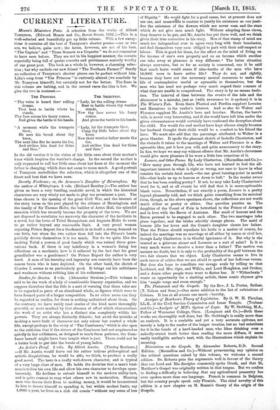Leonore, and Other Poems. By Lady Chatterton. (Macmillan and Co.)—
"How many pass through life, who have not learned to feel the• all- important interest in what is right or wrong, nor care to know in what consists the certain fatal mark—the one great turning-point in mortal life—that leads us up to heaven or down to hell." Is the reader aware that he has been reading poetry? If not, he may take Lady Chatterton's word for it, and at all events he will find that it is unexceptionable blank verse. Nevertheless, if not exactly a poem, Leonore is a pretty legend pleasantly told, and we think gains something from its metrical form, though, as the above specimen shows, the reflections are not worth much either as poetry or ethics. One question puzzles us. The daughter of the Count of Foix is betrothed to the Prince of Arragon and in love with the Baron of Anzizans. Her maid of honour and the Baron pretend to be engaged to each other. The two marriages take place together, and the brides adroitly change places. The maid of honour jilts her lover and the Count's daughter cheats her father. That the Prince should repudiate his bride is a matter of course, for indeed the marriage was no marriage at all either by canon or civil law, though Lady Chatterton is in blissful ignorance of it. But why is she treated as a grievous sinner and Leonore as a sort of saint? Is it so very much worse to deceive a lover than a father? The motive was meaner no doubt, but it is only to the profundity of the gulf between the two fair sinners that we object. Lady Chatterton seems to live in such terror of critics that we are afraid to speak of her ludicrous verses. But does she hope to conciliate our savage souls by telling us that Lockhart, and Mrs. Opie, and Wilkie, and Lord Houghton, and Croker, and a dozen other people were wont to flatter her. If "Witherbrain " wants an opportunity for a slashing article, these oomio rhymes give him "ample verge and room enough."






























 Previous page
Previous page